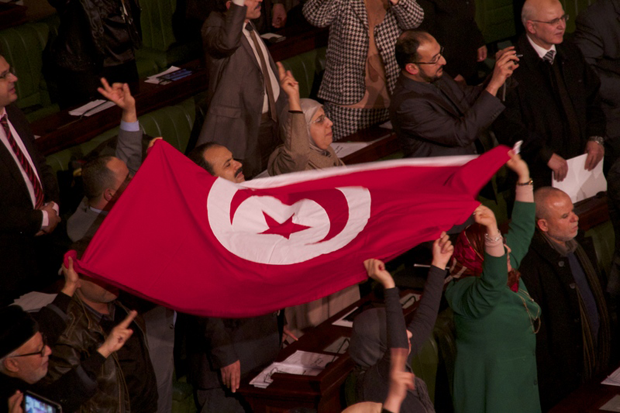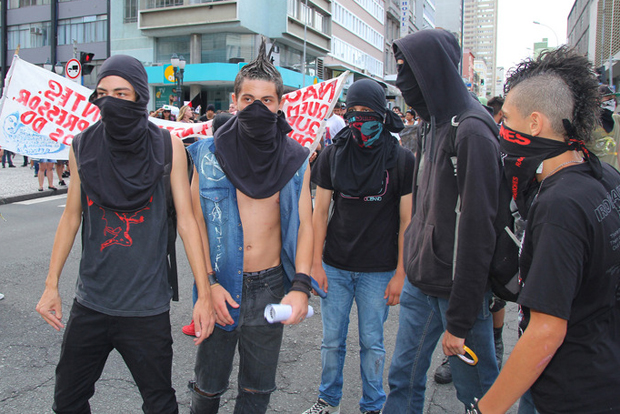10 Feb 2014 | News and features, Politics and Society, Tunisia

After decades of dictatorship and two years of arguments and compromises, Tunisians finally have a new constitution laying the foundations for a new democracy. Deputies celebrating the ratification of the new constitution for Tunisia. Photo: Mohamed Krit / Demotix
The Arab Network for Human Rights Information (ANHRI), a human rights umbrella organisation based in Cairo, issued a statement on 3 February strongly denouncing a recent attack on journalists in Tunisia. The incident saw a presenter and cameraman working for attacked by 5 members of the Tunisian General Labour Union.
The attack of 29 January happened as journalists working for satellite channel al-Mutawasit attempted to cover a strike outside the Tunisian General Labour Union’s provincial headquarters in Sfax. Tunisian news site Hour News reports that 5 union members attacked the two-man crew, threatening them and seizing recording equipment. The equipment was returned only after intense negotiations, and was found stripped of memory cards documenting the incident.
According to al-Mutawasit, this is far from the first such incident. In fact, they claim to have been victim to “a fierce onslaught” by the security services. Officials from the channel allege that, after a string of interrogations, eight members of the security forces stormed the studio on 31 October 2013, during a live discussion about the drafting of a new constitution. According to the presenter Salih Atiya, the officials gave no hint as to the justification for their surprise visit, and refused to give their names for security reasons.
The most recent confrontation on 29 January, and the increased incidence of attacks on journalists in the preceding months, has led the Media Protection League of Tunisia to issue an open letter, dated 2 February, to Tunisia’s new prime minister Mehdi Jomaa. In the letter, the group demanded a review of current legal protection for journalists, especially the hotly-debated Press Laws of 2011, which continue to be legally enforced despite controversy surrounding their contents.
This string of events, which appear to constitute a crackdown on the freedoms enjoyed by Tunisian television, print and radio broadcasters, comes amid growing optimism for the state of freedom of expression in other areas. Recent reports that Jabeur Mejri, sentenced to 7 ½ years in prison over a Facebook post, is to be released have sparked hope that the judiciary is becoming more mindful of human rights legislation.
Moreover, the signing of Tunisia’s new constitution on 27 January, after more than 2 years of wrangling, generated enthusiastic praise from inside the country and out. Prominent Tunisian human rights advocate Lina Ben Mhemni reported that it contains “some victories, but is not a triumph”, while others outside Tunisia were less measured. According to Women Living Under Muslim Law, it is a “progressive and monumental” document, one that makes Tunisia more progressive than the US with regards to women’s and workers’ rights, as well as health care and climate change. The Doha Centre for Media Freedom issued a specific statement praising the constitution for “enhancing freedom of expression“, detailing clauses that insist on “the freedom of access to information”.
The ratification of Tunisia’s new constitution undoubtedly marks an important victory for progressives in the country. However, the attack of 28 January and the events leading up to it leave one wondering how far press freedoms now enshrined in law will be protected in practice.
This article was published on 10 February 2014 at indexoncensorship.org
10 Feb 2014 | Americas, Brazil, News and features, Politics and Society

In Curitiba, about 300 protesters took to the streets of the central city asking for more health and safety improvements in the country and against the hosting of the World Cup 2014 in Brazil. (Image: João Frigério / Demotix)
On 8 January, residents in Rio’s Metrô-Mangueira favela, were greeted by government representatives, set to demolish houses and evict residents. A demonstration was led then by the residents to fight their removal, but once again violence broke out between the police and the protestors, with police firing rubber bullets into crowds.
Rio On Watch said: “Having evicted long-time residents to public housing units without any public consultation over the use of land – required by local legislation – the city left the land and houses to be occupied by those in most desperate need of public housing.” These “desperate” residents are now being forced out and given no alternative housing, despite promises from mayor Eduardo Paes that nobody would be left homeless.
The demonstration in the Metrô favela, is emblematic of the current mood all across Brazil. Triggered by a hike in already expensive bus fares, 2013 saw Brazil’s biggest protest movement for over 20 years, in what became known as the “V for Vinegar” movement or the “Salad Revolution”. More than two million protestors took to the streets to fight against issues such as government corruption, poor social services and a rise in the cost of living. Right at the heart of the movement however, was a feeling of alienation and exclusion from the decision making process for the preparations of the 2014 World Cup.
According to the United Nations Human Rights Council, in the context of the implementation of sporting mega events, all UN states must, “ensure full transparency of the planning and implementation process and the meaningful participation of the affected local communities therein”. However this transparency is not happening in Brazil as authorities bulldoze favelas, and replace them with car parks and shopping centres.
A report by the National Coalition of Local Committees for a People’s World Cup and Olympics said: “Supported by a twisted notion of ‘public interest’, the Brazilian state has systematically refused to establish horizontal dialogues with civil society groups and threatened communities.”
In many cases residents learn of their evictions through the media before government communications. This was true for the residents of Vila Autódromo in Rio, who first learned of their proposed eviction through the front page of the O Globo newspaper on 4 October 2011.
In other cases, residents are told by authorities that their properties must be demolished because of alleged structural risks. Three hundred homes were identified for demolition because of such “structural risks” in Pavão-Pavãozinho, but residents have been waiting since July 2011 for authorities to provide evidence of such risks. This is a further example of the Brazilian government failing to offer their citizens information or ensure political transparency.
The government has established two bodies to organise the World Cup, which exist outside the normal political structure. The 2014 World Cup Steering Committee and the Committee Responsible for Host Cities liaise with FIFA, the federal government and advisory bodies mostly comprised of private companies. Decisions made by these bodies are not discussed with the public, and information regarding plans is excluded from the general population.
In Curitiba, the population unanimously opposed the council’s decision to give £22.5m to the private construction of the João Américo Guimarães Stadium. However requests for information were denied and there was no public participation in the council’s decision.
The example of the João Américo Guimarães Stadium, is typical of the wider situation whereby the government is spending billions of dollars on the construction of infrastructure and stadiums without giving the people a say in the matter. The Arena da Amazônia stadium in Manaus has cost £151m, while The Economist estimates that the Brazilian government has already spent £1.9 billion on World Cup stadiums collectively.
Marcelo Pelligrini, a journalist from São Paulo told Index on Censorship: “This is a huge stadium [Arena da Amazônia] because of the standards of FIFA, but after the World Cup we have no use for this stadium, and after the tournament it will probably become a jail.”
“The main point in Brazil is the use of these millionaire stadiums. That is what the population is complaining about. They are spending half a billion reias on a stadium that has no use after the World Cup, and we have no good transportation, no health insurance, we have nothing,” Mr Pelligrini said.
The World Cup is not benefiting the Brazilian people, according to Pelligrini: “We have great stadiums, but no good services.” He also felt that the Brazilian people were not being given democratic representation in the decision making process.
Denied a say in the preparations for the World Cup, the Brazilian people flocked to the streets in 2013, to protest against the way the government has been organising the tournament. The protests were driven by a multitude of building grievances, but a feeling that the democratic process had broken down, and the voice of the Brazilian people was being ignored, was at the heart of the demonstrations. Protestors held banners proclaiming, “FIFA go home”, “We don’t need the World Cup, we need money for hospitals and education” and “World Cup for whom?”
These sentiments epitomise the zeitgeist of the Brazilian nation, and their feeling that the World Cup has only benefited the few, while he vast majority are excluded from the decisions and thus the benefits.
The recent protest in the Metrô-Mangueira favela underlines how these grievances are ongoing. The image of residents clashing once more with riot police depicts the ultimate breakdown in communications and democracy in the lead-up to the biggest, and supposedly most unifying, football tournament in the world.
This article was posted on February 10 2014 at indexoncensorship.org
7 Feb 2014 | News and features, United Kingdom

Journalist Jane Fae
Feminist writer Jane Fae says she has been stopped from opening a bank account for her new project – a history of the censorship of pornography.
Fae, a contributor to Index on Censorship, had agreed with NatWest bank to set up a business account to handle the incomes and outgoings for her new self-published book, Taming the Beast.
But according to a blog post today, Fae says the bank contacted her this morning (7 February) and reneged on the agreement.
Blogging at Faeinterrupted, the journalist, who has written for outlets from the Guardian to the Daily Mail (as well as this site) reported that she had gone through all the normal procedures with the bank and signed up for a new account. She goes on:
Then, this morning, out of the blue, the call. She had since run it past her boss…her manager.
Who was less impressed. “NatWest don’t do this sort of thing”, she explained.
“Er, what sort of thing? Publishing? Academic work?”
“No: the subject matter”.
I was incredulous. “You mean that NatWest will not sanction someone writing ABOUT a particular topic? Are there any other topics you’d rather people not write about in case, you know, in case it frightens the admin staff? Perhaps we had better not write about rape, or vioilence against women or…”.
Who knows.”
Fae is waiting for a proper explanation from NatWest.
A spokeswoman for the bank told Index the issue was being investigated
Index on Censorship will keep you up to date with developments.
UPDATE 07/01/14 16:05. A NatWest spokeswoman has been in touch with Index to tell us that the business manager of the branch in Stamford, Lincolnshire is arranging to meet Jane Fae next week. The bank says “the issue is not closed”.





